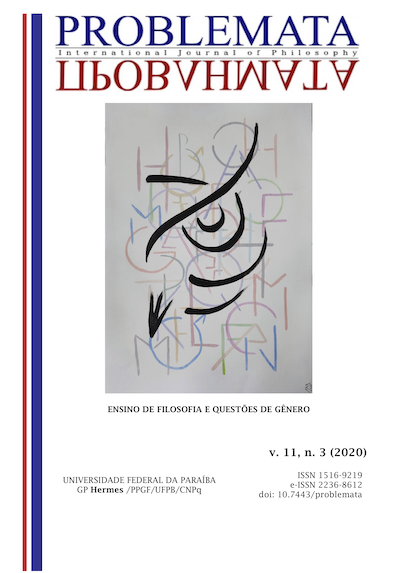GENDER DIVERSITY IN DEBATE:
A PROPOSAL TO FACE PREJUDICES IN PHILOSOPHY CLASSES
DOI:
https://doi.org/10.7443/problemata.v11i3.53934Keywords:
Philosophy teaching, Debate, Genre, Communicative Rationality, HabermasAbstract
The article presents a "communicative debate" procedure for the argumentative confrontation of prejudices about gender diversity by high school students in the teaching -learning of Philosophy. For this process, they appropriated the conceptual tangle of Ha bermas' "communicative rationality" for the validation of speech acts. Concepts such as understanding, truth, sincerity / correctness, in addition to mutual understanding and constitutional patriotism, guided the Philosophy classes and aimed, through debat es, to awaken in students the value of the collective construction of communicative competences, pointing them towards dialogical crossings . The main objective of this activity was to show that mutual understanding between colleagues is a factor to overcome the current socio -cultural contingency, marked by prejudices and discrimination in relation to the LGBTQI + population in society and, mainly, in the school world.
Downloads
References
DINIS, Nilson Fernandes. Homofobia e educação: quando a omissão também é signo de violência. Educar em Revista, Curitiba, Brasil, n. 39, p. 39-50, jan./abr. 2011. Editora UFPR 43.
HABERMAS. Jürgen. Pensamento pós-metafísico: estudos filosóficos. 2. Ed. Rio de Janeiro: Tempo Brasileiro,1990.
______. Consciência moral e agir comunicativo. Rio de Janeiro: Tempo Brasileiro, 1989.
______. A crise de legitimação no capitalismo tardio. Rio de Janeiro: Tempo Brasileiro, 1980.
______. O Discurso filosófico da modernidade. 3. ed. Lisboa: Dom Quixote, 2000.
______. La inclusión del otro: estudios de teoría política. Paidós, 1999.
______. Teoría de la acción comunicativa: complementos y estudios previos. Trad. Manuel Jiménez Redondo. Madrid: Catedra, 2001.
______. Teoria do Agir Comunicativo: racionalidade da ação e racionalização social. V. 1. Trad.: Paulo Astor Soethe. São Paulo: WMF Martins Fontes, 2016.
______. Teoria do Agir Comunicativo: sobre a crítica da razão funcionalista. V. 2. Trad.: Flávio Beno Siebeneichler. São Paulo: WMF Martins Fontes, 2016.
LUBENOW, Jorge Adriano. Sobre o método do discurso prático na fundamentação da ética do discurso de Jürgen Habermas. Cadernos do Pet Filosofia, Teresina, v. 2, n. 3, p.57-70, jan. 2011. Disponível em: . Acesso em: 15 jun. 2020.
MAIA, Antônio. A ideia de patriotismo constitucional e sua integração à cultura político jurídica brasileira. Revista Direito, Estado e Sociedade, n. 27, 2005.
MICHELMAN, Frank I. Morality, Identity and “constitutional patriotismo”. Ratio Juris, v. 14, n. 3, p. 253-271, 2001.
MÜHL, Eldon Henrique. Habermas e a Educação: ação pedagógica como agir comunicativo. Passo Fundo: UPF, 2003.
PEQUENO. Marconi. Educação em Direitos Humanos: Fundamentos teóricos metodológicos. Sujeito Autonomia e Moral. Editora Universitária. 2007. p. 187-204.
PINTO, José Marcelino de Rezende. A teoria da ação comunicativa de Jürgen Habermas: Conceitos básicos e possibilidades de aplicação à administração escolar. Paidéia, FFCLRP,Ribeirão Preto, 1995.
SOUZA, Geraldo Luiz de. Mediação e Habermas. Londrina, 2006
STERNBERGER, Dolf. Patriotismo constitucional. Universidad Externado, 2001.
WOLIN, Richard. “Introduction” In. HABERMAS, Jürgen. The New Conservatism: Cultural Criticism and the Historian’s Debate, Cambridge, Massachusetts: MIT Press, 1994.
Downloads
Published
Issue
Section
License
Authors who publish with this journal agree to the following terms:
- Authors retain copyright and grant the journal right of first publication with the work simultaneously licensed under a Creative Commons Attribution License that allows others to share the work with an acknowledgement of the work's authorship and initial publication in this journal.
- Authors are able to enter into separate, additional contractual arrangements for the non-exclusive distribution of the journal's published version of the work (e.g., post it to an institutional repository or publish it in a book), with an acknowledgement of its initial publication in this journal.
-
- Authors are permitted and encouraged to post their work online (e.g., in institutional repositories or on their website) prior to and during the submission process, as it can lead to productive exchanges, as well as earlier and greater citation of published work (See The Effect of Open Access).





